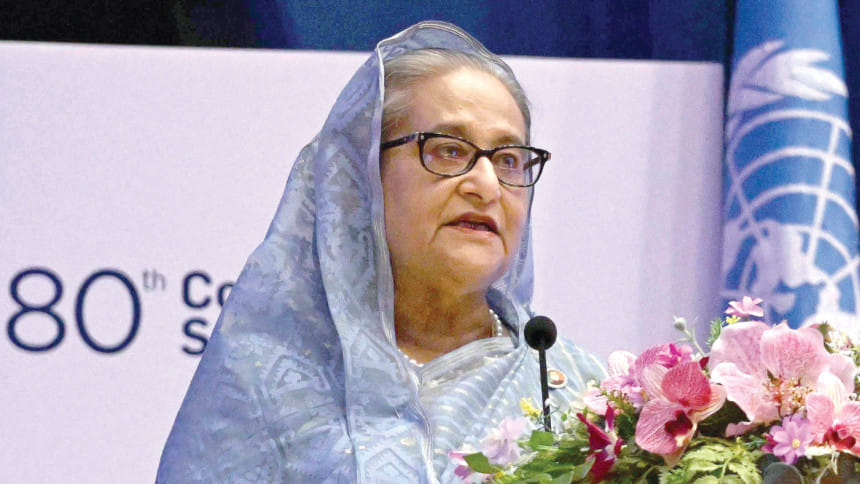Say ‘no’ to war, seek solution through talks
Prime Minister Sheikh Hasina yesterday urged all to speak out against all forms of aggression and atrocities and to say “no” to wars.
She was addressing the 80th session of the United Nations Economic and Social Commission for Asia and the Pacific (UNESCAP) at the ESCAP Hall in Bangkok.
Hasina, now in the Thai capital on a six-day official visit, said Bangladesh supports the UN secretary-general’s “A New Agenda for Peace”.
She said the pre-condition for sustainable development is lasting peace and security.
“We must settle regional disputes and tension through dialogue. Our mutual respect for national sovereignty and territorial integrity must remain paramount.”
The premier urged the Asia-Pacific regional countries and forums, especially ASEAN, to increase their efforts to end the Rohingya crisis.
“The origin of this crisis has been in Myanmar, and its solution also lies in Myanmar.
“As long as that solution remains out of reach, all our efforts at regional connectivity, integration, and prosperity will continue to be marked by a missing puzzle. Let us redouble our efforts to put that puzzle back in place,” she said.
Hasina said when thousands of Rohingyas from Myanmar fled to Bangladesh in August 2017, Bangladesh offered them temporary shelter.
“With an ever growing population, this has now become one of the largest humanitarian situations in the world,” she said.
In the backdrop of the ongoing armed conflicts in Myanmar, the Rohingya repatriation is also getting delayed, which is creating serious security risks within and beyond Bangladesh’s territories, the PM said.
She called upon the Asia-Pacific countries and forums, especially ASEAN, to play a proactive role in resolving the volatile situation in Myanmar.
“We must ensure that Rohingyas can go back home in safety and dignity at the earliest possible time.”
Hasina said that the Asia-Pacific region must stand united against its common enemies of poverty and hunger.
She said Bangladesh has reduced poverty from 41.51 percent to 18.7 percent between 2006 and 2022.
The country also reduced extreme poverty from 25.1 to 5.6 percent during the same period, the PM said. “We remain confident about eradicating extreme poverty by 2030.”
Hasina said Bangladesh’s current priority is to address inequalities through income distribution, asset ownership, and social protection.
She said Asia-Pacific region must put up a united front in tackling the climate crisis, biodiversity loss, and transboundary pollution.
“We need to push for ambitious climate financing goals beyond 2025 at COP-29. We need to cooperate on cross-border water management and air quality improvement. We must all prepare for growing extreme weather events,” the premier said.
In this regard, she suggested looking into Bangladesh’s experience in reducing disaster risk.
Briefly describing various development programmes and achievements of her government, Hasina said much of the development gains are affected by climate impacts.
“As a low-lying delta, Bangladesh has no option but to invest heavily in climate resilience,” she said.
She mentioned that Bangladesh has already been recognised as a global leader in climate adaptation.
Hasina said Bangladesh has urged the developed and emerging economies in the region to raise their time-bound emission reduction targets.
The premier invited UN-ESCAP to help build the capacity of climate-vulnerable countries to mobilise adequate international climate financing.
She said Bangladesh now provides critical links to the trans-Asian highway and railway networks.
“Our physical and digital infrastructures are being developed to foster regional trade and connectivity,” the PM added.
LondonGBDESK//



Comments are closed.